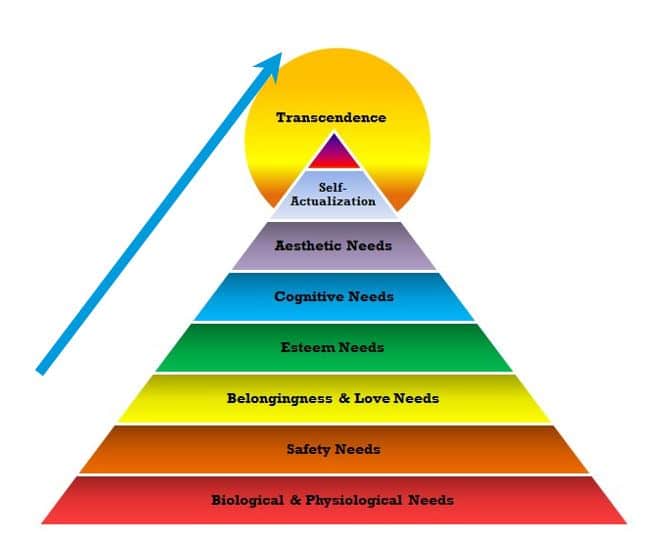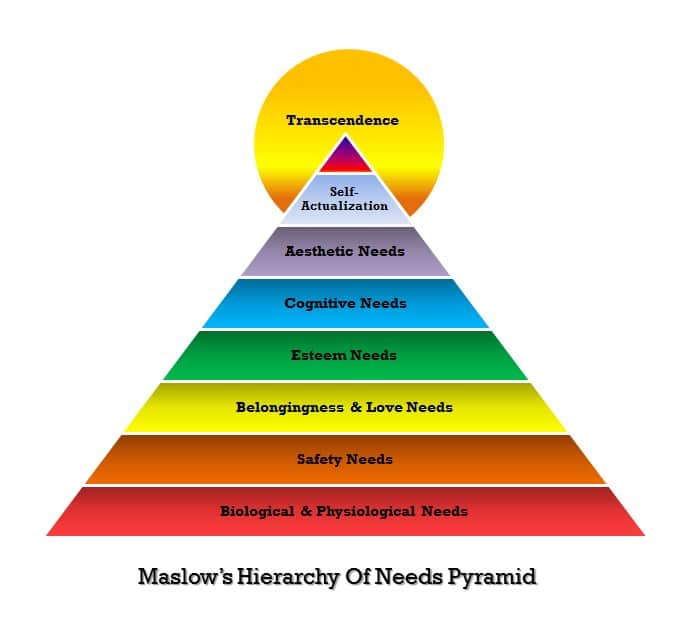What is the meaning of life? What is your purpose? Why are you here? Are you here for a reason? Is there a divine entity looking down on you? What happens after you die?
The way you answer these questions determines the overall context for everything you do in life. It is not often that people sit down and seriously consider these questions but I’m here to tell you that it’s worth putting in the time and effort to figure it out, and I will tell you how I have gone about it.
This is part six of a seven-part series on how to find purpose and direction in your life:
Part 1: Why It’s Worth Knowing
Part 2: Overview
Part 3: Know Yourself
Part 4: Build Strong Foundations
Part 5: How Should We Live?
Part 6: Why Purpose Doesn’t Interest You yet (and When It Will)
Part 7: Discovery
Is Purpose Important?
Yes, it’s worth figuring our your purpose. If you don’t think so, I think I know why.
Maslow’s Hierarchy of Needs
In the field of psychology, Abraham Maslow created this hierarchy of needs in his 1943 paper “A Theory of Human Motivation”. Maslow stated that people are motivated to achieve certain needs. When the lowest need on the hierarchy is fulfilled you seek to fulfil the next one, and so on.
The original five-stage model has been expanded to include cognitive and aesthetic needs1, and later transcendence needs2.
The levels can be broken up into basic (or deficiency) needs and growth needs. The basic needs are physiological, safety, love, and esteem. The growth needs are cognitive, aesthetic, self-actualisation, and transcendence. The deficiency needs are named as such because they are said to motivate people when they are unmet. Also, the longer the need is not met, the stronger the need to fulfil it. For example, going without air or food.
Examples of needs that fit on each level are:
- Biological and Physiological: basic life needs like air, food, water, shelter, warmth, sleep, sex
- Safety: protection, security, order, law, limits, stability
- Belongingness and Love: family, affection, relationships, work group
- Esteem: achievement, status, responsibility, reputation
- Cognitive: knowledge, understanding, meaning, self-awareness
- Aesthetic: beauty, balance, form, elegance, simplicity
- Self-actualisation: personal growth, self-fulfilment
- Transcendence: helping others to self-actualise
My goal for NeverSettle can be summed up in one picture:
You must satisfy lower level basic needs before progressing on to meet higher level growth needs. Once these needs have been reasonably satisfied, you may be able to reach the highest level called self-actualisation.
If I can help you overcome the obstacles you have in the lower levels in the hierarchy, and if I can then help you self-actualise, then I’m doing what I set out to do (transcend).
Why Purpose Doesn’t Interest You yet
If personal development, growth, or finding your purpose don’t interest you at the moment, then you’re probably stuck on one of the lower levels of Maslow’s Hierarchy. Perhaps your focus is on school or work, perhaps you’re in debt and not financially secure, perhaps you’re looking for a significant other, or you’re not feeling successful.
What levels of the hierarchy do you spend the most time on? You have the opportunity to comment your answer at the bottom of this post, and I hope that you take it. Feedback I get from you will enable me to create more relevant and helpful posts in the future.
What the Hierarchy Means for Your Purpose
In the previous post in this series asking How Should We Live?, we concluded that we should all aim to maximise our fulfilment. The question of what brings you fulfilment might not be fully answered and, if so, Maslow’s Hierarchy could offer some insight. Maslow’s studies of human motivation suggested we all strive to climb the pyramid pictured above. The top two levels are good places to look for when deciding what direction you want your life to take: personal development, self-improvement, human flourishing, maximising your potential; and, helping others to do the same.
The next post in the series will wrap up everything we have done up to this point and can be used as a template for summing up what your life means to you and what direction you want it to take.
This is part six of a seven-part series on how to find purpose and direction in your life:
Part 1: Why It’s Worth Knowing
Part 2: Overview
Part 3: Know Yourself
Part 4: Build Strong Foundations
Part 5: How Should We Live?
Part 6: Why Purpose Doesn’t Interest You yet (and When It Will)
Part 7: Discovery





